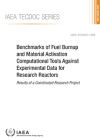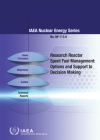The fuel cycle of research reactors is similar to that of most power reactors, including all steps from fuel fabrication to spent fuel management. The IAEA assists Member States in all phases of this cycle and, upon request, helps them convert their research reactors from high- to low-enriched uranium.
Research reactor fuel cycle
Similar to most power reactors, the majority of research reactors operate with enriched uranium. Their fuel cycle involves the fabrication of fuel; its use in the reactor; the temporary storage, reprocessing or direct disposal of spent fuel; and the management of radioactive waste. It also includes the various steps required to transport uranium, fresh fuel, spent fuel and radioactive waste.
The management of spent fuel, as well as of the associated infrastructure and costs, is a key challenge for countries that host a research reactor but have no – or only a limited – nuclear power programme. It is particularly important to understand how to manage ageing nuclear material as part of the storage of spent fuel, and to identify sustainable options for its disposal.
The IAEA assists Member States in all aspects of the research reactor fuel cycle. It helps them develop new low-enriched uranium research reactor fuels, sustainable fuel supply solutions, and viable options for spent fuel management. The Agency also assists with the development of low-enriched uranium targets used to produce medical radioisotopes and with the handling of radioactive waste generated in the medical isotope production process.
Tailor-made IAEA assistance for Member States
The use of high-enriched uranium fuel allows for more compact cores with higher neutron fluxes, longer refueling intervals and more varied utilization capabilities. At the same time, its use increases the risk of nuclear material being misused. However, most research reactors can utilize low-enriched uranium as fuel and maintain the desired performance characteristics.
This has led to international efforts to minimize the use of high-enriched uranium in research reactors. The IAEA assists Member States, upon request, to convert research reactors and return fresh and spent high-enriched uranium fuel to its country of origin. It tailors its support to the specific needs of each case, which often includes the sharing of technical knowledge and equipment.








